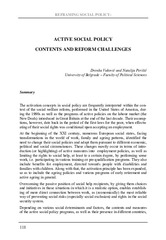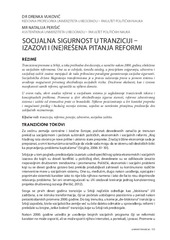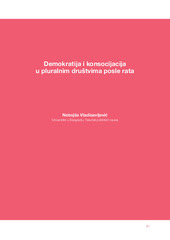Претраживање
Приказ резултата 1-10 од 118
Active Social Policy – Contents and Reform Challenges
(Friedrich-Ebert-Stiftung : Bon, 2008)
The activation concepts in social policy are frequently interpreted within the context of the social welfare reform, performed in the United States of America, during the 1990s as well as the programs of active policies ...
Nova realnost na tržištu rada u Francuskoj / New reality at the labor market in France
(Fakultet političkih nauka : Beograd, 2009)
Zemljani put revolucije: Seljačko pitanje u Englesovim kasnim radovima
(Durieux : Zagreb, 2020)
Rad se bavi seljačkim pitanjem u socijalističkoj misli druge polovine 19. veka, s posebnim osvrtom na rad Fridriha Engelsa. U klasičnoj socijalističkoj literaturi, seljačko pitanje je dugo vremena bilo obeleženo kao ...
Female Labour Market Participation in Serbia
(Verlag Barbara Budrich, 2018)
Socijalna sigurnost u tranziciji - izazovi i (ne)rešena pitanja reformi
(Friedrich-Ebert-Stiftung : BonCentar za demokratiju Fakulteta političkih nauka : Beograd, 2012)
Tranzicione promene u Srbiji, u toku prethodne dve decenije, a naročito nakon 2000. godine, obeležene
su socijalnim reformama. One su se odvijale, između ostalog, u penzijskom osiguranju, zdravstvu i
socijalnoj zaštiti ...
Feministička dekonstrukcija i rekonstrukcija države blagostanja
(Institut za filozofiju i društvenu teorijuFakultet političkih nauka, 2018)
Predmet rada su feministička promišljanja države blagostanja, koja predstavljaju
jedan od uticajnih kritičkih i emancipatorskih pristupa u postojećim teorijskim
pravcima u društvenim naukama i u društvenoj praksi. U ...
Decentralization of Social Protection System in Serbia
(Editura Performantica : Iasi, 2009)
The article presents the key-goals of the reforms in the Serbian social protection
system that were motivated by the decentralization and deinstitutionalization of the
previously highly centralized system. It also analyses ...
Demokratija i konsocijacija u pluralnim društvima posle rata / Democracy and consociation in plural post-war societies
(Fakultet političkih nauka, Univerzitet u Sarajevu; ForumZFD, 2018)
Odsustvo saradnje i međunacionalni sporovi u pluralnim društvima posle rata često ne izviru iz konsocijacije kao mehanizma za regulaciju sukoba, već iz nedemokratskog okruženja u kojem te institucije funkcionišu. Demokratski ...
Demokratija i polupredsednički sistem u Srbiji danas
(Fondacija Heinrich Böll, Regionalna kancelarija za Jugoistočnu Evropu u Beogradu : Beograd, 2011)
Yugoslavia’s successor states
(John Harper Publishing : London, 2004)
The paper discusses territorial disputes that arose during and after the break up of Yugoslavia. It starts by outlining the institutional context of the multinational Yugoslav federation within which the application of the ...




